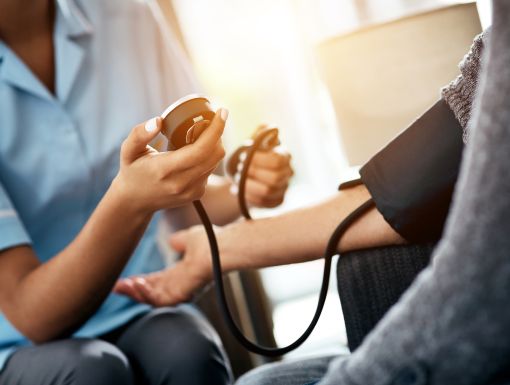
Why Is High Blood Pressure More Common In Black People?
If you grew up in a community like mine, you are familiar with everyone having "high blood," being on blood pressure medicine or praying for healing for their high blood pressure. When looking at the statistics, the numbers are shocking. In the United States, 57% of Black adults have hypertension, compared with 44% of white adults. Not only is high blood pressure more common in Black adults, but hypertension also begins earlier in life and tends to be more severe in Black adults. The reasons are not entirely understood as environmental and genetic factors have not been fully established, and research is ongoing. Still, I will dive in and define high blood pressure, discuss why it is critical and outline risk factors for hypertension.
What is high blood pressure?
Blood pressure refers to the pressure that blood applies to the inner walls of the arteries. Arteries carry blood from the heart to other organs and parts of the body. "Hypertension" is the medical term for high blood pressure.
Normal blood pressure: "systolic" (top number) of less than 120 and “diastolic” pressure (bottom number) of less than 80
Elevated blood pressure: systolic pressure between 120 to 129 and diastolic pressure less than 80
High blood pressure
- Stage 1: systolic pressure between 130 to 139 and diastolic pressure between 80 to 89
- Stage 2: systolic pressure of at least 140 and diastolic pressure of at least 90
Why is high blood pressure concerning? Heart disease is the leading cause of death in all Americans. Untreated high blood pressure increases the strain on the heart and arteries, eventually causing organ damage and increases the risk of heart failure, heart attack, stroke, erectile dysfunction, loss of vision and kidney disease. In addition, all this organ damage can happen without you having or noticing any symptoms, which is why high blood pressure is referred to as the "silent killer."
What risk factors affect Black people more?
Significant risk factors for high blood pressure among Black adults are related mainly to historical and systemic factors. These include conditions in which a person is born and lives, which are social elements of health. These factors include:
- Lower levels of education
- Unemployment
- Lower income
- Higher daily stress
- Poverty
- Lack of access to affordable and high-quality fresh food
- Unhealthy high sodium/low potassium diet
- Lack of regular exercise.
In addition, distrust of health care professionals based on historical discrimination and lack of access to medication increases the risk of high blood pressure in Black adults. Other risk factors for hypertension are advancing age, obesity, having relatives who had/have high blood pressure or drinking a lot of alcohol.
How do I know if I have high blood pressure?
Even if you don't have symptoms, screening for high blood pressure is recommended to begin at age 18. Making an appointment for your annual wellness exam is one of the best things you can do for your health. A visit to your primary care physician is often the first line of defense against preventing significant illnesses. These annual visits are also the best way to understand your overall health. For an accurate diagnosis of high blood pressure, your healthcare provider will use an average based on two or more readings obtained on two or more occasions. You can also buy a home blood pressure monitor so you can check your blood pressure at home.
It is important to know your family's medical history as you can. Ask your immediate family members what medical problems arise in the family. Is there a history of cancer? Heart disease? Your doctor can assess this information and recommend screenings if they feel you are susceptible to certain conditions.
What if I have high blood pressure?
Treatment of hypertension begins with lifestyle changes. Making lifestyle changes involves little or no risk. Recommended changes often include:
- Reduce the amount of salt in your diet.
- Exercise at least 30 minutes per day most days of the week
- Lose weight if you are overweight or have obesity.
- Avoid drinking too much alcohol.
- Stop smoking.
I am from Louisiana, and food is the center of our culture; it is not the healthiest. We can keep food in the center but make it more beneficial to continue to do what we love, but healthily. Substitute high sodium, high calorie, high fat and foods with high carbohydrate content with low sodium, low calorie, low fat and low carbohydrate content.
For example, consider swapping your favorites for healthy alternatives like:
|
In addition, try to avoid eating fast foods or processed foods. Consider preparing your meals at home or select healthy menu options if eating on the go. Try to incorporate more fruits, vegetables and whole grains into your diet. A low-sodium diet contains less than 1.5 grams (1,500 milligrams) of sodium daily. Eat high-potassium foods like bananas, sweet potatoes or spinach; aim for 3,500-5,000 milligrams of dietary potassium per day. Lastly, make sure you drink enough water. Sometimes we think we're hungry and we're thirsty. Try drinking a glass of water before a meal to satisfy your potential thirst.
Increase your physical activity; get your body moving, even if it's as simple as walking to your mailbox. Adults need 150 minutes of moderate-intensity physical activity each week and two days of muscle strengthening. It could be 30 minutes a day, five days a week. You can spread your activity out during the week and break it up into smaller chunks of time.
Also, being overweight or having obesity increases your risk of having not only high blood pressure, but also diabetes, and cardiovascular disease. A person is considered overweight if their BMI is greater than 25, while a person with a BMI of 30 or greater is classified as having obesity. People who are overweight or obese can see significant reductions in blood pressure with even modest weight loss.
A "drink" of alcohol is defined as 5 ounces of wine, 12 ounces of beer or 1 ounce of hard liquor. Drinking more than two drinks per day increases the risk of high blood pressure compared to not drinking, making high blood pressure more challenging to control. Binge drinking (consuming four to five drinks within two hours) is an even more significant problem for overall health and hypertension.
If you smoke, quit. Talk with your doctor about programs and products that can help you stop. Also, avoid secondhand smoke, which is smoke from burning tobacco products, such as cigarettes, cigars or pipes. Secondhand smoke is smoke exhaled or breathed out by a person smoking.
So, suppose you have tried lifestyle modification, and your blood pressure remains elevated (usually at or above 140/90). Your healthcare provider may consider starting a medication to help reduce your blood pressure. In African Americans, thiazide-type diuretics (fluid or water pills) and calcium channel blockers are more effective in lowering blood pressure when given alone or as initial medicines in a multidrug regimen. Sometimes, treatment of hypertension includes more than one blood pressure medication. Always take your medicines as prescribed by your health care provider, and do not stop taking them without discussing them with your health care provider.
The most important thing you can do to reduce the impact of hypertension is to know your risk(s) and numbers and find a healthcare provider whom you can trust and who is invested in your healthcare and outcome. Establish a treatment plan with your provider and adhere to the plan. This plan may include a referral to a specialist specializing in treating your disease process. Let's change the narrative and reduce the statistics; our children and future generations are counting on us.



